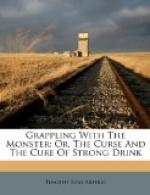In this failure of memory nature gives a solemn warning that imminent peril is at hand. Well for the habitual drinker if he heed the warning. Should he not do so, symptoms of a more serious character will, in time, develop themselves, as the brain becomes more and more diseased, ending, it may be, in permanent insanity.
MENTAL AND MORAL DISEASES.
Of the mental and moral diseases which too often follow the regular drinking of alcohol, we have painful records in asylum reports, in medical testimony and in our daily observation and experience. These are so full and varied, and thrust so constantly on our attention, that the wonder is that men are not afraid to run the terrible risks involved even in what is called the moderate use of alcoholic beverages.
In 1872, a select committee of the House of Commons, appointed “to consider the best plan for the control and management of habitual drunkards,” called upon some of the most eminent medical men in Great Britain to give their testimony in answer to a large number of questions, embracing every topic within the range of inquiry, from the pathology of inebriation to the practical usefulness of prohibitory laws. In this testimony much was said about the effect of alcoholic stimulation on the mental condition and moral character. One physician, Dr. James Crichton Brown, who, in ten years’ experience as superintendent of lunatic asylums, has paid special attention to the relations of habitual drunkenness to insanity, having carefully examined five hundred cases, testified that alcohol, taken in excess, produced different forms of mental disease, of which he mentioned four classes: 1. Mania a potu, or alcoholic mania. 2. The monomania of suspicion. 3. Chronic alcoholism, characterized by failure of the memory and power of judgment, with partial paralysis—generally ending fatally. 4. Dypsomania, or an irresistible craving for alcoholic stimulants, occuring very frequently, paroxysmally, and with constant liability to periodical exacerbations, when the craving becomes altogether uncontrollable. Of this latter form of disease, he says: “This is invariably associated with a certain impairment of the intellect, and of the affections and the moral powers.”
Dr. Alexander Peddie, a physician of over thirty-seven years’ practice in Edinburgh, gave, in his evidence, many remarkable instances of the moral perversions that followed continued drinking.
RELATION BETWEEN INSANITY AND DRUNKENNESS.
Dr. John Nugent said that his experience of twenty-six years among lunatics, led him to believe that there is a very close relation between the results of the abuse of alcohol and insanity. The population of Ireland had decreased, he said, two millions in twenty-five years, but there was the same amount of insanity now that there was before. He attributed this, in a great measure, to indulgence in drink.




